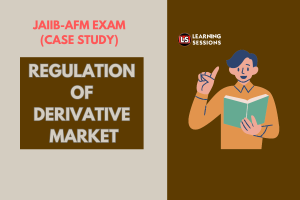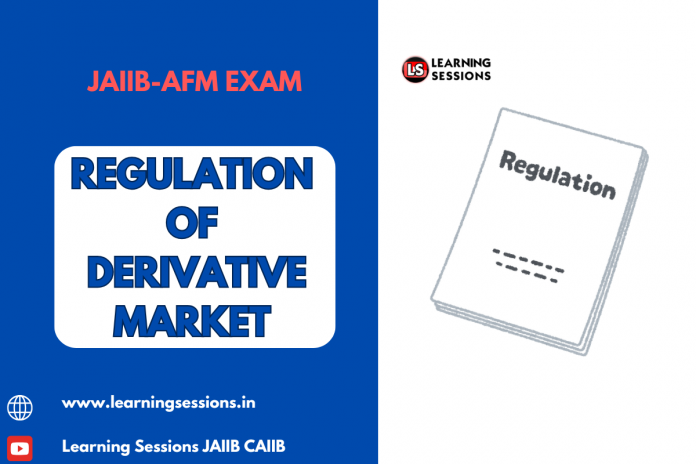The derivatives market plays a significant role in financial systems worldwide, allowing for risk management, speculation, and arbitrage opportunities. However, its complex nature and potential for systemic risks make regulation crucial. Learning Sessions presents this article and delves into the case study on the topic of regulation of the derivative market, as outlined in the JAIIB’s Accounting and Financial Management (AFM) module.

📚 JAIIB Study Resources 📚
👉 Check Here
👉 Check Here
👉 Check Here
👉 Get Tests Here
👉 Check Here
DOWNLOAD PDF REGULATION OF DERIVATIVE MARKET-CASE STUDY
Derivatives are financial instruments deriving their value from an underlying asset, such as stocks, commodities, interest rates, or currencies. The dominant types include futures, options, swaps, and forwards. They are extensively used for hedging risks, speculation, and diversifying portfolios. In the JAIIB AFM module, derivatives are studied under financial markets and regulations. This topic introduces students to the principles of derivative products and the complexities surrounding their trade and regulation. For banking professionals, considering derivative markets is essential to managing financial risk effectively and complying with regulatory standards.
For the extensive preparation of candidates, get details through our YouTube videos for JAIIB AFM Module wise Syllabus with explanations and tips to help candidates in their preparation journey.
You may also like these JAIIB case studies:
JAIIB | AFM | CAPITAL STRUCTURE
JAIIB | AFM | EXCHANGE RATE MECHANISM
Primary demonstration for regulating derivatives include:
- Risk Mitigation: Regulation ensures that financial institutions hold adequate capital to cover potential losses.
- Transparency: Reporting and compliance requirements help authorities monitor market activities, minimizing the chances of market manipulation.
- Market Integrity: Rules governing fair trading prevent malpractices, ensuring market stability.
- Consumer Protection: Regulations protect retail investors from high-risk transactions they may not fully understand.
To summarize, the regulation of derivative markets remains central in today’s financial landscape, balancing the benefits of derivatives with systemic risk control. Through modules like JAIIB AFM, banking professionals gain an understanding of these complex markets and the critical regulations governing them. With knowledge of derivative market regulation, professionals can play a major role in maintaining a stable, transparent financial system. This deep understanding aids not only in examination success but also in fostering a responsible and stable banking environment. Learning Sessions provides additional information about JAIIB AFM CURRENCY CONVERSION by giving examples of real life scenarios.
Learn more about this case study through our YouTube channel and PDF.
Get access to our Telegram Channel for free Pdfs of JAIIB.
You May also Find these JAIIB Posts Useful
FINANCIAL DERIVATIVES PRODUCTS





